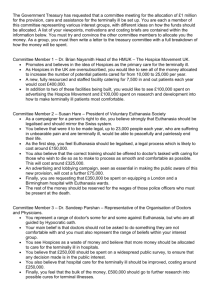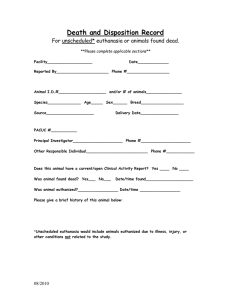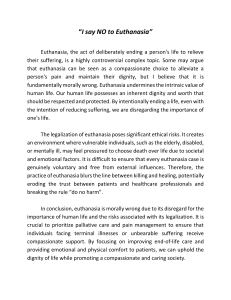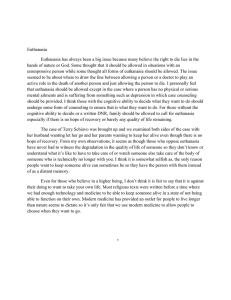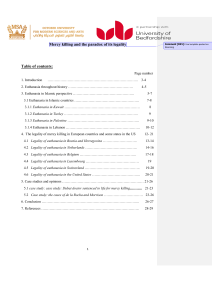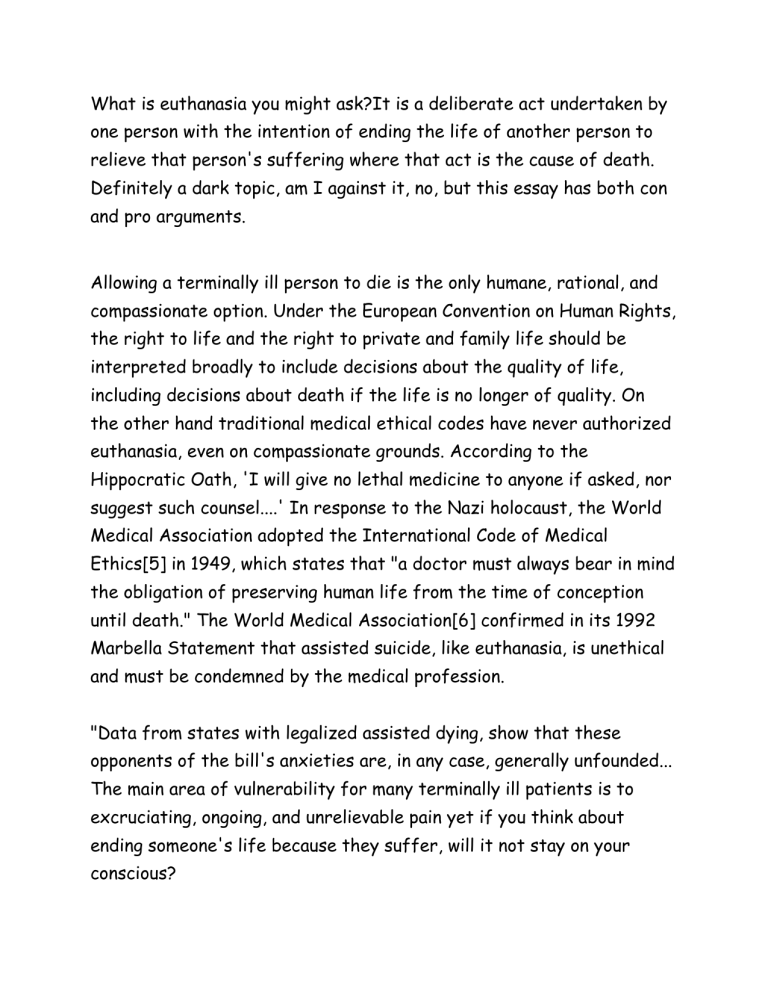
What is euthanasia you might ask?It is a deliberate act undertaken by one person with the intention of ending the life of another person to relieve that person's suffering where that act is the cause of death. Definitely a dark topic, am I against it, no, but this essay has both con and pro arguments. Allowing a terminally ill person to die is the only humane, rational, and compassionate option. Under the European Convention on Human Rights, the right to life and the right to private and family life should be interpreted broadly to include decisions about the quality of life, including decisions about death if the life is no longer of quality. On the other hand traditional medical ethical codes have never authorized euthanasia, even on compassionate grounds. According to the Hippocratic Oath, 'I will give no lethal medicine to anyone if asked, nor suggest such counsel....' In response to the Nazi holocaust, the World Medical Association adopted the International Code of Medical Ethics[5] in 1949, which states that "a doctor must always bear in mind the obligation of preserving human life from the time of conception until death." The World Medical Association[6] confirmed in its 1992 Marbella Statement that assisted suicide, like euthanasia, is unethical and must be condemned by the medical profession. "Data from states with legalized assisted dying, show that these opponents of the bill's anxieties are, in any case, generally unfounded... The main area of vulnerability for many terminally ill patients is to excruciating, ongoing, and unrelievable pain yet if you think about ending someone's life because they suffer, will it not stay on your conscious? The concept of ordered liberty implicitly recognizes the right of a competent, terminally ill person to forgo agonizing anguish and welcome a prompt and dignified demise. The exercise of this right is essential to maintaining one's sense of self and physical integrity, just as the rights protected by Court's rulings regarding marriage, family relationships, reproduction, contraception, childrearing, and the decision to forgo or stop receiving life-saving medical treatment are. Despite that“do we want doctors deciding who lives and who dies? No, we do not want that. The Declaration of Independence says that we should have the right to pursue life, liberty, and the pursuit of happiness. Nothing in it says we have the right to pursue death, nothing.” In drawing to a close mostly physicians are for euthanasia although some are against it. What is your opinion on this matter? Resources: 1. Roger Crisp, DPhil Professor of Moral Philosophy, University of Oxford “Assisted Dying and Protecting the Vulnerable,” blog.practicalethics.oc.ac.uk 2. Helena Berger President and CEO of the American Association of People with Disabilities “Assisted Suicide Laws Are Creating a ‘Duty-to-Die’ Medical Culture,” thehill.com 3. ACLU Amicus Brief in Vacco v. Quill American Civil Liberties Union (ACLU) https://euthanasia.procon.org/wp-content/uploads/sites/43/vacc ovquillamicus.pdf 4. Tom Coburn, MD US Senator (R-OK) Consideration of House Resolution 2260, Pain Relief Promotion Act of 1999, gpo.gov 5. https://www.medscape.com/viewarticle/882334 6. https://www.medscape.com/viewarticle/874341
